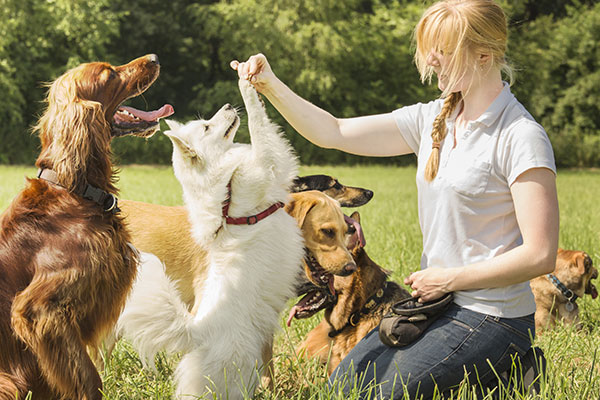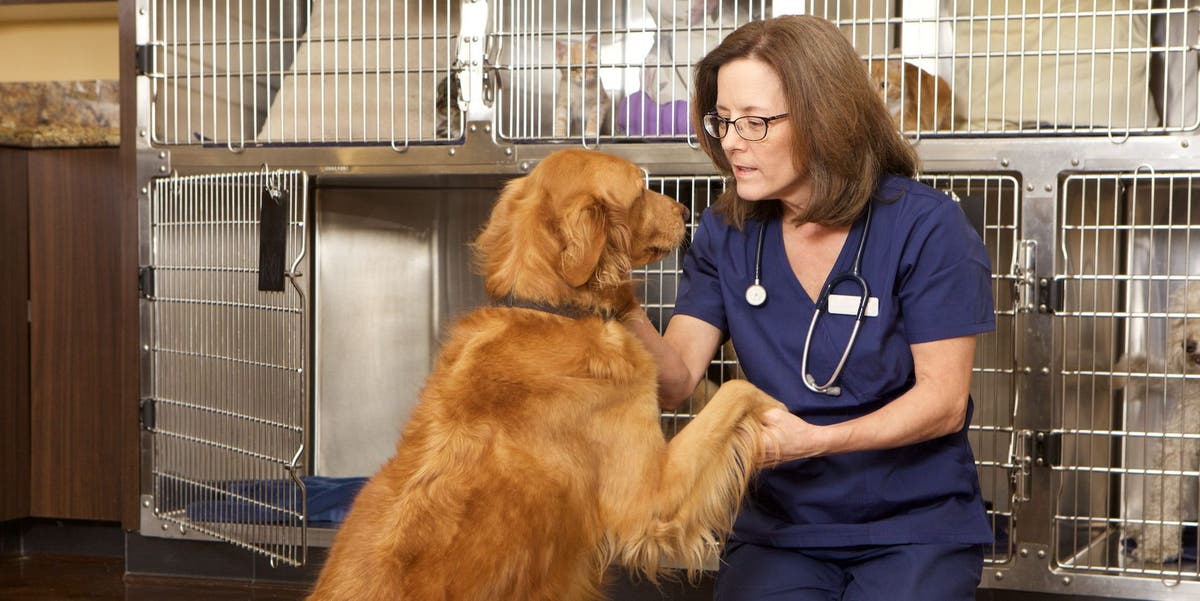How to identify the right canine behaviourist near me for aggression and fear
Comprehending the Duty of a Vet Behaviourist in Pet Dog Training and Wellness
The function of a veterinary behaviourist is essential in attending to the complex relationship between animals and their owners. They integrate veterinary medicine with understandings from pet actions scientific research to tackle concerns like aggression and anxiousness. Unlike conventional trainers, their approach concentrates on the underlying root causes of these behaviors. This nuanced perspective elevates inquiries about the performance of traditional training methods and just how a deeper understanding can transform pet health. What approaches do they employ to attain these outcomes?
What Is a Veterinary Behaviourist?
A veterinary behaviourist is a specialized specialist that concentrates on understanding and addressing the behavior issues of animals, particularly pets. Their experience integrates vet medication and pet actions science, enabling them to identify and deal with a variety of behavioral issues - board certified veterinary behaviourist. These specialists frequently hold postgraduate degrees, such as a Master's or PhD in animal behavior, and are certified by appropriate organizations, guaranteeing they have a deep understanding of animal psychology
Veterinary behaviourists assess pets via comprehensive observation and analysis, considering variables such as genetics, environment, and training history. They establish customized actions adjustment strategies, which may consist of desensitization strategies, positive support strategies, and ecological modifications. Cooperation with pet proprietors is important, as they provide assistance and support throughout the training procedure. Eventually, the objective of a vet behaviourist is to enhance the health of the pet while fostering an unified partnership in between pets and their owners.
The Significance of Recognizing Animal Behavior
Comprehending pet actions is essential for both pet proprietors and experts in the area of animal care, as it lays the foundation for efficient communication and training. Identifying how pets view their atmosphere and react to stimuli allows caretakers to produce an extra unified living scenario. Insight into behavioral signs, such as body movement and articulations, fosters stronger bonds between pet dogs and their proprietors. By valuing the natural reactions and demands of various species, people can customize their training approaches to suit these aspects, advertising much better understanding and collaboration. Furthermore, a solid grasp of behavior science help in determining stress factors and possible triggers, permitting for positive interventions. On the whole, recognizing pet actions not only boosts the wellness of pet dogs however also enriches the experiences of those who take care of them, ultimately resulting in healthier, happier relationships.
Common Behavioral Issues Attended To by Veterinary Behaviourists
Vet behaviourists frequently deal with typical behavior problems in pets, consisting of hostility and concern reactions. They additionally concentrate on stress and anxiety and anxiety management, which can substantially affect a pet's well-being. Recognizing these problems is vital for establishing efficient training and intervention strategies.
Aggression and Worry Responses
While many pet dog owners may check out aggressiveness and fear responses as basic behavior issues, these complex reactions often stem from underlying stress and anxiety or previous injury. Veterinary behaviourists play an important role in identifying the source of these habits, which can manifest in different forms, consisting of growling, biting, or extreme worry of particular scenarios. Comprehending these triggers is essential for developing effective training approaches tailored to every pet dog's one-of-a-kind circumstances. Behaviourists utilize methods such as desensitization and counter-conditioning to aid animals manage their anxieties and aggressiveness. In addition, they enlighten pet proprietors regarding ideal management strategies, highlighting the relevance of perseverance and consistency. Attending to hostility and worry feedbacks not only improves the animal's lifestyle however additionally reinforces the bond between animal and proprietor.
Anxiousness and Stress Administration
Anxiousness and tension prevail issues that many animals deal with, typically resulting from modifications in their setting, absence of socializing, or previous unfavorable experiences. Vet behaviourists play a crucial function in determining the underlying reasons of these concerns. They utilize various techniques, including behavior modification, desensitization, and counter-conditioning, to assist pet dogs handle anxiousness. In addition, they may advise ecological adjustments, such as producing risk-free spaces or providing enrichment tasks that promote relaxation. Collaboration with family pet owners is necessary, as behaviourists guide them in comprehending their pet dog's signals and carrying out effective coping techniques. By dealing with stress and anxiety and tension, veterinary behaviourists add significantly to improving the total health and high quality of life for pets and their households.
How Vet Behaviourists Vary From Standard Trainers
Vet behaviourists vary from typical trainers mostly in their instructional histories and training. While standard instructors commonly concentrate on obedience and fundamental commands, veterinary behaviourists stress understanding and addressing underlying behavior problems, including clinical factors to consider into their approach. This distinct emphasis allows them to give a much more detailed treatment for pets with complicated behavioral obstacles.
Education and Training Differences
Recognizing the distinction between vet behaviourists and standard trainers is crucial for pet owners seeking effective training options. Vet behaviourists have postgraduate degrees in vet medicine, usually followed by specialized training in pet practices. This education outfits them to address complex behavioural problems that may come from medical problems or psychological factors. In comparison, conventional trainers normally have qualifications from training programs that concentrate on obedience and standard commands without delving into the underlying emotional or clinical facets. While both experts intend to boost family pet practices, veterinary behaviourists can diagnose and treat behavioral problems holistically, integrating clinical understanding right into training techniques. This critical difference highlights the value of picking the right professional based upon the pet dog's details requirements.
Emphasis on Behavioral Issues
Dealing with behavioral problems requires a nuanced approach that distinguishes veterinary behaviourists from typical instructors. While conventional fitness instructors usually concentrate on obedience and basic commands, vet behaviourists discover much deeper right into the underlying reasons for problematic practices. They utilize a considerable understanding of animal psychology and therapy methods, which are rooted browse this site in scientific study. This expertise allows them to recognize problems coming from anxiety, anxiety, or aggression, rather than just dealing with surface-level signs. On top of that, vet behaviourists analyze the pet dog's general health, thinking about environmental variables and the pet's background. By incorporating medical knowledge with behavioral strategies, they provide customized services that promote long-lasting behavioural change, guaranteeing both the pet's and proprietor's quality of life are noticeably enhanced.
Clinical Considerations Consisted Of
While standard trainers may forget underlying clinical concerns, vet behaviourists focus on a comprehensive analysis of an animal's health and wellness as a fundamental action in resolving behavioral problems. This technique permits them to determine potential clinical problems that might add to unfavorable practices, such as stress and anxiety, pain, or neurological conditions. By integrating medical analyses into their method, vet behaviourists can team up with vets to guarantee an all natural understanding of the pet's well-being. Furthermore, they can recommend appropriate therapies or modifications to training plans based on clinical findings. This substantial viewpoint distinguishes veterinary behaviourists from conventional trainers, as they attend to both behavioural and health-related factors, ultimately leading to extra reliable and lasting results for animals and their owners.

The Process of Dealing With a Veterinary Behaviourist
Teaming up with a vet behaviourist entails an organized strategy to attending to a pet dog's behavior issues. The process starts with a comprehensive analysis, where the behaviourist collects comprehensive details concerning the pet dog's history, pop over to this site atmosphere, and details habits that are bothersome. This typically consists of surveys, meetings with the pet owner, and often observations of the pet in its atmosphere.
Complying with the assessment, the veterinary behaviourist formulates a tailored intervention plan that may include behavioral modification strategies, training approaches, and, if necessary, referrals for medical evaluations. dog behaviourist near me. The plan is created to be sensible and attainable, ensuring that it fits seamlessly right into the family pet owner's lifestyle
Succeeding follow-up sessions are important to monitor progression, change techniques, and offer support. This collaborative effort not only aims to change unwanted habits yet also to improve the general health of the animal, making sure a harmonious partnership between the family pet and its owner.
Enhancing Your Family pet's Lifestyle Through Behavioral Assistance
Enhancing a pet's lifestyle through behavior assistance is vital for promoting a healthy and balanced and satisfying partnership in between animals and their owners (board certified veterinary behaviourist). Veterinary behaviourists play a vital duty in recognizing and resolving behavioral problems that may impede a family pet's health. With customized methods, they help minimize anxiety, concern, and aggressiveness, ultimately advertising a much more balanced and satisfied pet dog
Behavioral assistance encompasses various techniques, including favorable reinforcement, environmental enrichment, and socialization. By carrying out these approaches, owners can create a nurturing setting that encourages favorable habits. This not only improves the pet's emotional wellness yet also enhances the bond between animal and owner.
Furthermore, regular consultations with a veterinary behaviourist warranty that any arising useful link behavior worries are promptly addressed, avoiding rise. In general, purchasing behavioral support is a positive strategy that greatly improves an animal's life, leading to enhanced physical and mental wellness results.
Often Asked Inquiries
What Credentials Do Veterinary Behaviourists Have?
Vet behaviourists usually hold a veterinary degree, followed by specialized training in animal behavior. Many likewise have qualifications from acknowledged companies, showing their know-how in addressing animal habits problems and advertising total pet wellness.
Can Vet Behaviourists Recommend Medication for Family Pets?


Vet behaviourists, possessing veterinary levels and specialized training, can indeed suggest drug for family pets. This capability enables them to address underlying behavior problems efficiently, frequently incorporating medicinal therapy with behavioral modification strategies for ideal results.
For How Long Does Behavior Modification Typically Take?
Behavior treatment period varies significantly, typically varying from a couple of weeks to a number of months. Aspects influencing this timeline consist of the family pet's specific issues, consistency of training, and the owner's interaction in the process.
Are Remote Examinations Available With Vet Behaviourists?

How Much Does a Veterinary Behaviourist Appointment Price?
The expense of a veterinary behaviourist appointment usually varies from $100 to $300, depending upon aspects such as area, experience, and session length. Additional costs may request follow-up assessments or specialized services.